A Haitian Creole Education System Is Critical for Haiti's Development - Language Justice.
- Wilsonn Telimo Lwi

- Dec 14, 2023
- 9 min read

I am Wilson Thelimo Louis, Haitian, and I live in Boston, Massachusetts. I earned a master's degree in public service from the University of Arkansas Clinton School of Public Service in the United States and a bachelor's degree in law and legal sciences from the State University of Haiti. In addition to being a social communicator, I am also a poet. As I always say in poetry, as a small butterfly that flies on the dew, like a small bird that flies after the rain has fallen, I feel as if I am on my way to advocate for Haitian Creole at 100 %.
There are over 97% of Haitians have NO access to university education, according to the national minister of education, Nesmy Manigat, and many of them have no opportunity to excel in their desired fields. My fellow citizens, this is a crime against intellectual integrity. For the sake of the children to have the same chance as their diaspora counterparts, I guarantee you that if we do not promote Creole education in Haiti right now at all levels, we will end up looking for practical solutions, which are asking foreign countries for weapons, asking foreign countries for money, asking for food for Haiti, which are all NON-PHILANTHROPIC actions taken by the Government of Haiti.
The problem we are facing in Haiti is that we are dealing with a bunch of animals. People need to think about what they are doing. As we live in the age of technology and promoting artificial intelligence, people cannot thoroughly analyze anything. It seems they are incapable of even thinking of a project idea that begins with a context, then goes on to create a strategy to implement it, and finally provides results to sustain itself. We have destroyed our intellectual resources, and because of this, we are no longer human.
We believe that starting from ITIAHaiti, we can show the world that Haiti has unique cultural values, such as respect for family and elders, a commitment to education, and a rich heritage and history. By uniting and celebrating these values, we can create a positive image and representation of Haiti and its people. Haiti is not a country where children wear their pants wrong, disrespect elderlies, vagabonds, and gangsters; whereas in our community, there is always scum: those are not true about Haiti.
The school bench is a barrier preventing Haitian children from succeeding. There is nothing else that children in Haiti can do to succeed in this century once you stop them from advancing on the school bench. To engrave the scales of success in children's lives, we should allow them to do so by finishing school. Some children choose to have fun, go to drugs, and spend their time in a wasted manner: that is their choice. The Haitian educational system, on the other hand, is preventing children from reaching their full potential by stopping them in high school and university. This practice must be stopped, and it has to be stopped right now if we want to prevent it from happening to autonomous Haiti. There is no doubt that education is one of the most urgent needs in Haiti.
Did you know that the schools in Haiti are one of the first places where theft, corruption, and fraud start? A thesis is a work in which a student has completed a research project and submitted it to a jury for approval to obtain a degree from the university. Did you know that there are a lot of students who need help to complete these final projects because they're in French? Students need to gain the knowledge to conduct the research and write their capstone, but they need help to write it in French due to language barriers. Those students must buy and study a written project by heart to present it before a jury when they get their license.
Finding a student who speaks 5 minutes of French in Haitian schools can be challenging. Did you know that? Is it impossible to communicate in French for even two minutes? It is a difficult task. There are those, however, who dare to do so in a way that is programmed, without subjectivity, without being themselves in speaking. They are robotized because they do not want to make mistakes and not to be bullied by their classmates. I believe this to be a fundamental issue that needs to be addressed. If you speak Creole in a classroom, the professor will tell you: "Exprimez-vous! Exprimez-vous cher maître!" (Express yourself, express yourself, future lawyer) because, in court, you will have to speak French to get your point across.
French is preserving its autonomy over us by making us speak their language. The United States is a superpower because its language is spoken the most globally. If Haiti claims its soul through its mother tongue, the Creole language, France will lose its value, authority, and intellectual power. If I had a voice in Haiti's chapters, I would dispense all those who have failed high school from the twelve-grade study level. I meant that I would ensure they finished high school and that a Creole education system would be incorporated into all schools. Furthermore, I intend to stop high school at the end of the 12th grade, as the United States does with its high school system.
No matter how hard we try, we need help finding answers to our project ideas as citizens of civil society. Through ITIAHaiti, a 501c3 literary organization, we say, wow, let's touch on the matter of the country together! Reflecting on the emptiness of the Government at this time drives us today to call on authorities as concerned citizens who understand a concept, a well-defined issue, to see what we can do as meat in front of carnivores to solve Haiti's social and political problems. It is time for us to enter Government agencies as good public servants to lead with more transparency and accountability.
In my opinion, I don't see Haitians being fed every day, nor do I see them being taught to fish. However, we must work together to form a monolithic stone that the entire community can build on for a brighter tomorrow. Often, we see the development of an area that focuses on what we experience at that current moment in our lives in the present. Still, we do not work on improving it for future generations, that is, for their benefit. As a jurist, Haiti has no better hope than to let the judicial system lead at this point, even though it has been accused of corruption. Please allow them to see if Haitians do not have a little credibility in their chemistry, jurism, professionalism, ethics, and patriotism in their culture if they are to be taken seriously as a nation.
In Haiti, trade schools need to be in the hands of people with scientific notions and knowledge, people who have completed high school, people who have graduated from universities, people who have master's degrees and doctorates, people who have a high level of education. The school system should stop blocking young people in ninth, twelfth, and thirteenth grades. The corrupted school system precludes students from finishing high school, so they cannot become a lawyer nor be able to pursue any scientific qualification. The educational system makes Haitian students not complete high school so that they become nothing in society when they grow up, so they do not compete with the elite children in the country.
In Haiti, if more Haitians finish school, it will result in a reduction in juvenile delinquency and kidnapping, as well as a reduction in environmental degradation. In Port-au-Prince, do you see the markets, and when it rains, what damage is being done on the streets? The other question I would like to ask is: would you, as a doctor in any discipline, those of you who have a master's degree, be willing to accept your yard, in front of your house, or your neighborhood dirty, as people in Haiti are eating on trashes that we can't even say their names?
In my opinion, if education were conducted in the language that all Haitians have the most excellent understanding of, Creole, then there would be a greater chance of having a more significant number of Haitians complete their schooling. There will be greater access to universities if more Haitians finish high school, and greater creativity will be demonstrated in business. There will also be a decrease in illiteracy in Haiti. I propose an educational approach to help the development of Haiti on a sustainable basis. I am putting forward a proposal that the mother tongue should be adopted as the language of instruction at all levels of Haitian education to reduce the rate of 97% of Haitians who do not have the opportunity to attend university because they are under a French education system that is imposed on them.
Haiti's traditional leaders are being bought by the French Government, which wants to preserve their linguistic autonomy by buying the brains of our population, the brains of the next generation, so they can remain intellectual superpowers for a very long time. As a society, we should not consider school a barrier to success but rather an opportunity to encourage citizens to become more educated. Having more educated people in Haiti would enable those who lead to be more authentic, and the community would be able to trust one another to rule if the population had more educated citizens.
There is no truth to the statement that there are not enough words in the Creole language to define scientific concepts. Creole has all the words to describe every idea that exists in every culture in the world. All languages borrow words from other languages to define philosophical concepts in the original language. A linguistic medium is essential to education, and Haiti has only one language, Creole. We have 100% of our population that speaks a language. Article 5 of the Haitian Constitution stipulates that Creole is the language that binds all Haitians together - Creole and French are the national languagesof Haiti. What kind of education are we talking about if we do not wish to train a population that speaks only one language in its language?
How do you define a word? In simple terms, a word is a graphic representation of a concept. How would you define a concept? Concepts are virtual representations of images that are based on facts. For example, you can speak Creole with me, and I will give you words you do not know, words I make up, and you will not know what they mean. The definitions can be found! For example, if I tell you that I created a word called «Zopher.» A zophical art is an art created by a person currently, which brings satisfaction, glory, and fame, but in the future, this art will represent a poison that will destroy the community. In other words, a person who has created a factory in a forested area and used trees as a method of operation.
Intellectuals are people who can discern and analyze. In Haiti, we limit the 97% of people who have not entered university, and the 3% of people who are called intellectuals due to the educational barriers that make us believe that those who have not completed high school are not intellectuals and those who have not finished university cannot get a good job. In my opinion, this is an intellectual problem that must be solved immediately.
A young man in Haiti who reaches the 12th grade, or who is stuck in the 9th grade, or who is not allowed to go on to the 12th grade or the 13th grade, is advised to learn to be a mason foreman, to lay ceramics, to make building electricity, to learn pose blocks, etc. It is something you know better than I do regarding those topics or the young man should pursue a career as a cabinetmaker, working the earth. Several sciences are involved in these things and should not only be taught at the level of the trades or professional disciplines. Driving down the highways of the United States, the people who make the great studies work on them and create the roads and significant buildings we see daily. Professional scientists are the ones who construct houses, fish in the sea, work the earth, and breed. In other words, the people leading the most remarkable studies and research make these possible.
In many cases, people stuck in their lives because they failed to succeed in school seek to make positive changes. However, they may need to learn to make those changes despite their desire. Taking a closer look at the zombies of Haiti, we can see that they are dehumanized. The 3% of the people we call intellectuals in Haiti cannot survive on anything they know, and their intellectuality is useless because they cannot live off it. It has always been my position to say that at that moment, a person who chooses to lead Haiti's zombies is like digging a hole and then entering yourself into that hole if we take the small minority that does not possess the analytical ability to make policy for an entire population, and who do not even know the attributions assigned to them. We must invest in education. As more people are trained, we will understand that a qualified person can lead Haiti. Otherwise, there is always going to be a catastrophic outcome.
By studying in our mother tongue, more Haitians will have a greater chance of completing their studies abroad. After graduation, they can return to their home countries and serve the local community. In almost all cases, when we travel to another country, someone will ask us what language we speak, to which we will reply: I speak both French and Creole, my native language. Despite this, when they start talking to us in French, we do not understand what they are saying, nor can we speak French. I think that the true tragedy of the matter is that Haitian intellectuals are not even able to write the language they only master, which is Haitian Creole, and they are not even able to speak and write French, as they pretend they know it.
Wilson Thelimo Louis,
Dedicated Philanthropist and Language Justice advocate.










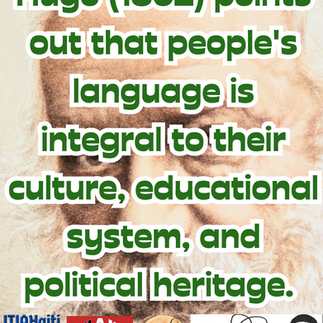

































































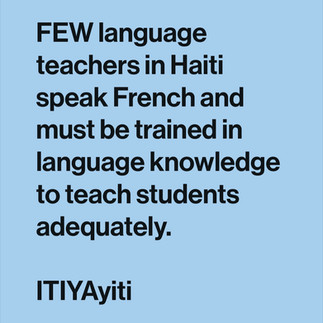



















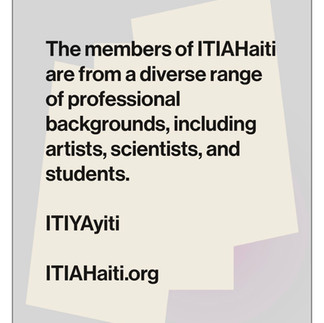











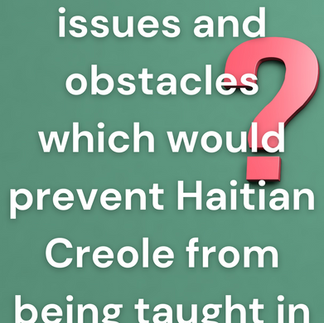





































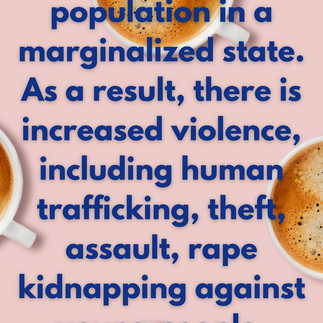


Haiti's development is intricately tied to education, and a Creole-based education system is critical for advancing language justice. Emphasizing Haitian Creole, the language spoken by most of the population, ensures that education is accessible and inclusive. By using Creole in schools, students can learn more effectively, improving literacy rates and overall educational outcomes. This approach fosters a stronger sense of identity and community.
For a smoother learning experience globally, services like Zetexa eSIMs can help travelers stay connected while exploring educational initiatives in countries like Haiti